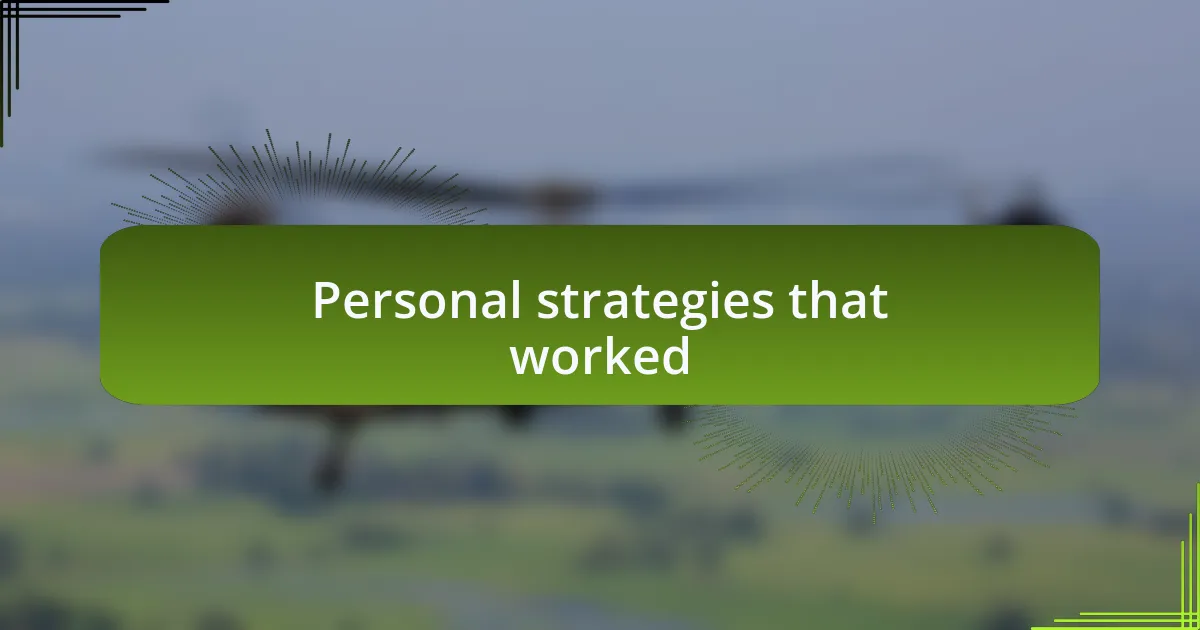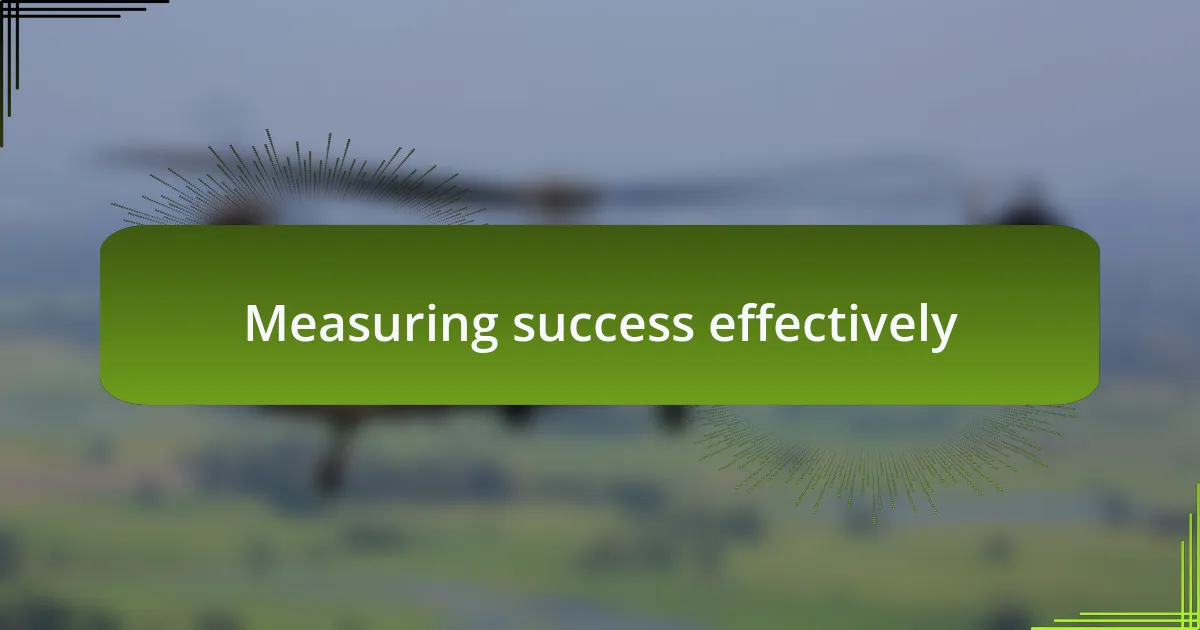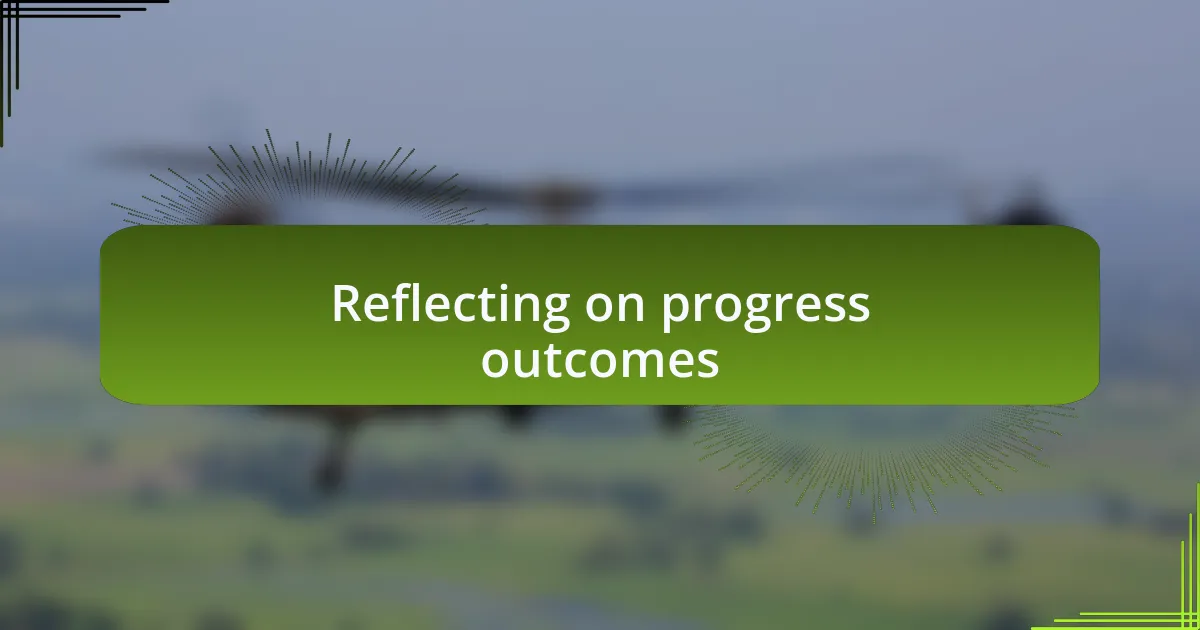Key takeaways:
- Progress tracking enhances motivation and accountability, fostering collaboration and personal growth through regular reflection.
- Utilizing various tools like project management software, spreadsheets, and journaling can effectively visualize and document progress.
- Setting clear goals and specific metrics, along with regular reviews, provides a framework for measuring success and refining strategies.
- Reflecting on experiences, including setbacks, can reveal valuable insights and contribute to future success.
![]()
Understanding progress tracking
Progress tracking is about keeping tabs on how far you’ve come in your projects, and it can make a world of difference. I remember when I first started using a simple spreadsheet to log my daily tasks; it was enlightening to see my accomplishments written out. Have you ever felt that burst of satisfaction when you cross an item off your list? That feeling reinforces your motivation and helps you see the bigger picture.
One important aspect of progress tracking is accountability, not just to yourself but also to your team. When I began sharing my progress with colleagues, I noticed a significant boost in collaboration. We would discuss our goals and celebrate milestones together. Isn’t it empowering to have a network that supports you on your journey?
Moreover, tracking progress doesn’t just highlight what you’ve achieved; it also sheds light on where you can improve. I learned this firsthand during a challenging project where I used project management software to visualize my progress. It revealed patterns in my workflow that I hadn’t noticed before. Have you ever felt stuck and wished for clarity? This insight transformed my approach and turned obstacles into opportunities for growth.
![]()
Importance of tracking progress
Tracking progress is crucial because it serves as a tangible reminder of how much you’ve accomplished. I once participated in a long-term engineering project where seeing the incremental updates each week kept my spirits high. Isn’t it motivating to visually appreciate how far you’ve come, especially when the end goal seems distant?
Another vital aspect of tracking progress is fostering a growth mindset. I remember facing setbacks in a project and doubting my abilities. But as I recorded my progress, I could see my learning curve. Don’t you find it empowering to realize that each misstep contributes to your development rather than detracts from it?
Finally, tracking progress builds a roadmap for future tasks. When I look back at my past projects, I can pinpoint the strategies that worked well and those that didn’t. How often do we reflect on our journey? This reflection not only informs my current approach but also equips me to tackle new challenges with fresh insights.
![]()
Tools for progress tracking
Tools for tracking progress can take many forms, each offering something unique. For instance, I’ve found that project management software like Trello or Asana allows me to break down tasks into smaller, manageable steps. Each completed task provides a burst of satisfaction, and it’s rewarding to see my progress visually represented on a board. Have you ever felt that thrill when checking off items on your to-do list?
Another tool that has been invaluable is a simple spreadsheet. It initially seems basic, but I love how I can customize it to track my specific metrics. During a particularly challenging project, I used a spreadsheet to log my daily accomplishments and setbacks. It became my personal accountability partner, reminding me that even small wins mattered. Doesn’t it feel good to track everything, knowing that every little detail adds to the bigger picture?
Lastly, I can’t overlook the impact of journaling on my progress tracking. I often jot down my thoughts and reflections at the end of each week. This simple practice not only helps me to recall my challenges but also highlights how far I’ve come over time. Have you tried reflecting on your journey in this way? I can assure you that looking back at my entries often sparks new ideas and solidifies my commitment to ongoing growth.
![]()
Creating a progress tracking plan
Creating a progress tracking plan begins with setting clear and achievable goals. I remember when I first tried this approach; I wrote down my objectives in a simple format, breaking them down into monthly and weekly targets. It was like putting together a road map that guided me in my journey—don’t you think having that visual direction can be inspiring?
Next, I recommend establishing specific metrics to measure your success. For instance, I utilize KPIs (Key Performance Indicators) tailored to my projects. One time, I aimed to improve my coding skills within certain parameters, such as the number of projects completed or hours of practice logged. By quantifying my progress, I felt a stronger connection to my results—doesn’t it feel empowering to witness your growth in numbers?
Finally, don’t underestimate the power of regular reviews in your progress tracking plan. I found that setting aside time for weekly reflections transformed my approach. It became a ritual, almost like a mini-celebration of my achievements, where I would evaluate what worked and what didn’t. How often do you pause to appreciate your efforts and recalibrate your strategies? Trust me, this practice not only boosts motivation but also clarifies my next steps, keeping me aligned with my goals.

Personal strategies that worked
Tracking progress isn’t just about numbers; it’s about finding what resonates with you personally. I remember using a color-coded system to represent different stages of my projects. Each hue signified a level of completion, and it truly sparked joy every time I could mark something off. Have you ever noticed how satisfying it feels to visualize progress in a vibrant way?
Another strategy that worked wonders for me was incorporating accountability partners into my routine. I have a friend who shares similar goals, and we would check in every couple of weeks. The combination of encouragement and gentle nudges kept us both focused. It’s fascinating how sharing your journey with someone else can amplify your dedication—have you considered finding a partner to help bolster your commitment?
Lastly, I prioritized documenting my experiences along the way in a journal. I recall one entry after a tough project; I expressed both frustration and pride. This practice allowed me to process my emotions and recognize growth over time. How often do you take a moment to reflect on not just what you achieved, but how you felt while getting there? Believe me, those insights can be just as valuable as any metric.

Measuring success effectively
Measuring success effectively often comes down to setting clear, achievable goals. I remember when I switched from vague objectives to specific milestones for my projects. Instead of just saying, “I want to improve my skills,” I broke it down into actionable steps, like “I will learn a new software tool by the end of the month.” Hasn’t that shift in clarity made a world of difference in your own progress?
Another route that really resonated with me was using visual progress trackers. I found that displaying my goals on a bulletin board, complete with photos and reminders, kept me motivated in ways I hadn’t anticipated. When I would glance at my board and see my dreams unfold in images, it ignited a spark of determination within me. Can you recall a time when visual reminders reinvigorated your drive?
Finally, I learned the importance of reviewing my progress regularly. Every month, I set aside a few hours to reflect on what I’ve accomplished and where I could improve. I remember a particularly challenging month where I felt discouraged, but during my review, I realized I was actually ahead of my timeline. Reflecting helped me understand that success is often a series of small victories. How do you evaluate your own progress? Perhaps a structured review might unveil insights you’ve been overlooking.

Reflecting on progress outcomes
Reflecting on progress outcomes has truly been a game changer for me. I remember feeling a sense of satisfaction when I took the time to list down all my achievements at the end of a project. This exercise not only highlighted my growth but also revealed patterns in my work—the areas where I consistently excelled and those that needed a little extra attention. Have you ever noticed how acknowledging even small wins can bolster your confidence significantly?
One lesson I learned the hard way was that not all progress is linear. There was a project where I hit a few roadblocks, causing me to doubt my abilities. However, when I took a moment to reflect, I realized that those challenges had equipped me with new problem-solving skills. It’s fascinating how adversity can shape us, isn’t it? I wonder if you’ve experienced a similar shift when reflecting on challenging moments.
Regularly revisiting my goals after tracking progress has offered invaluable insights. I’ve found that sometimes, what seemed like a setback laid the groundwork for future success. For example, I once had a goal that I thought was achievable, but I fell short. Upon reflection, however, I discovered a deeper understanding of the subject matter that ultimately made my next attempt much more fruitful. Have you given yourself the chance to examine how your setbacks can fuel your next steps forward?